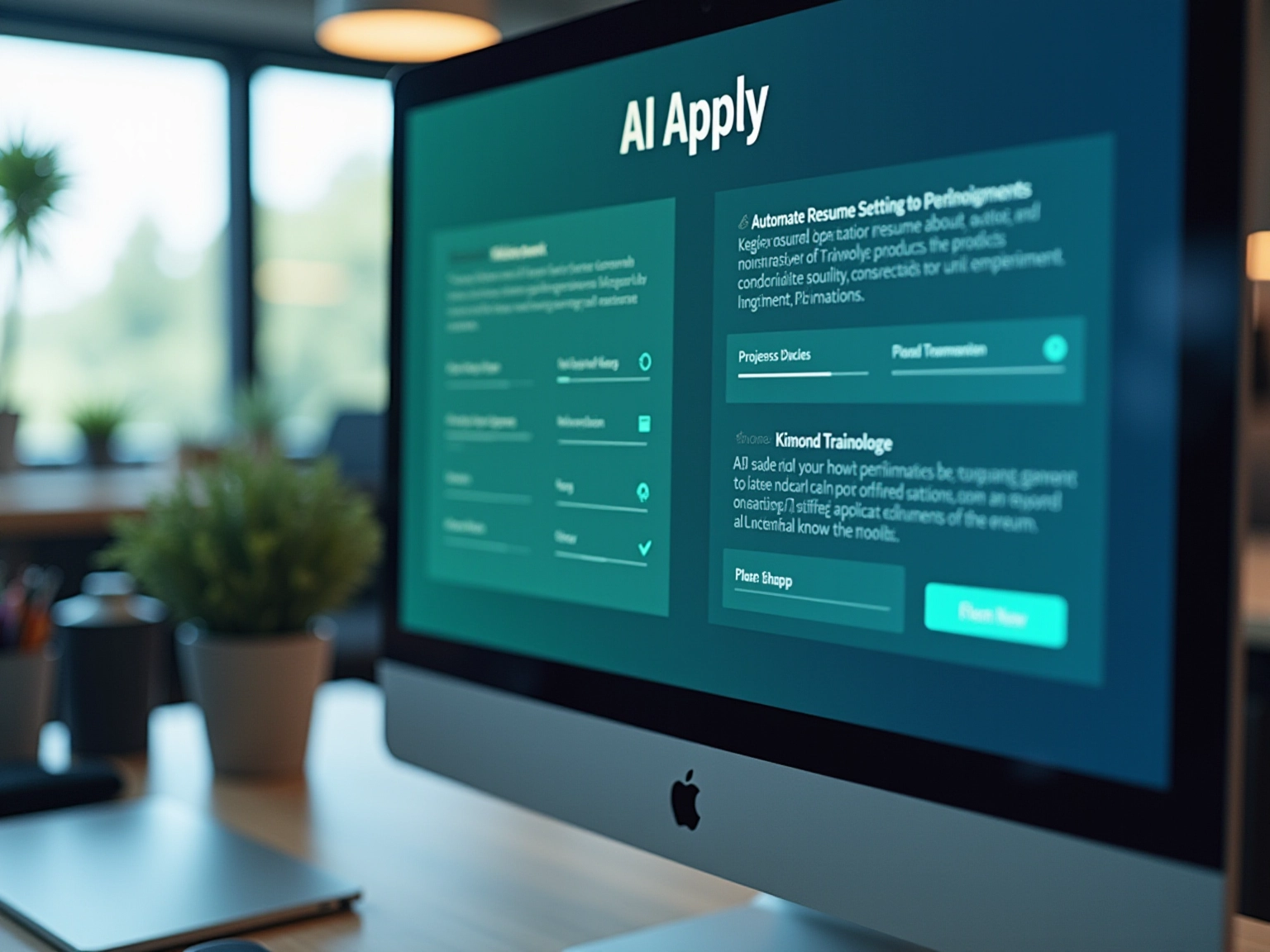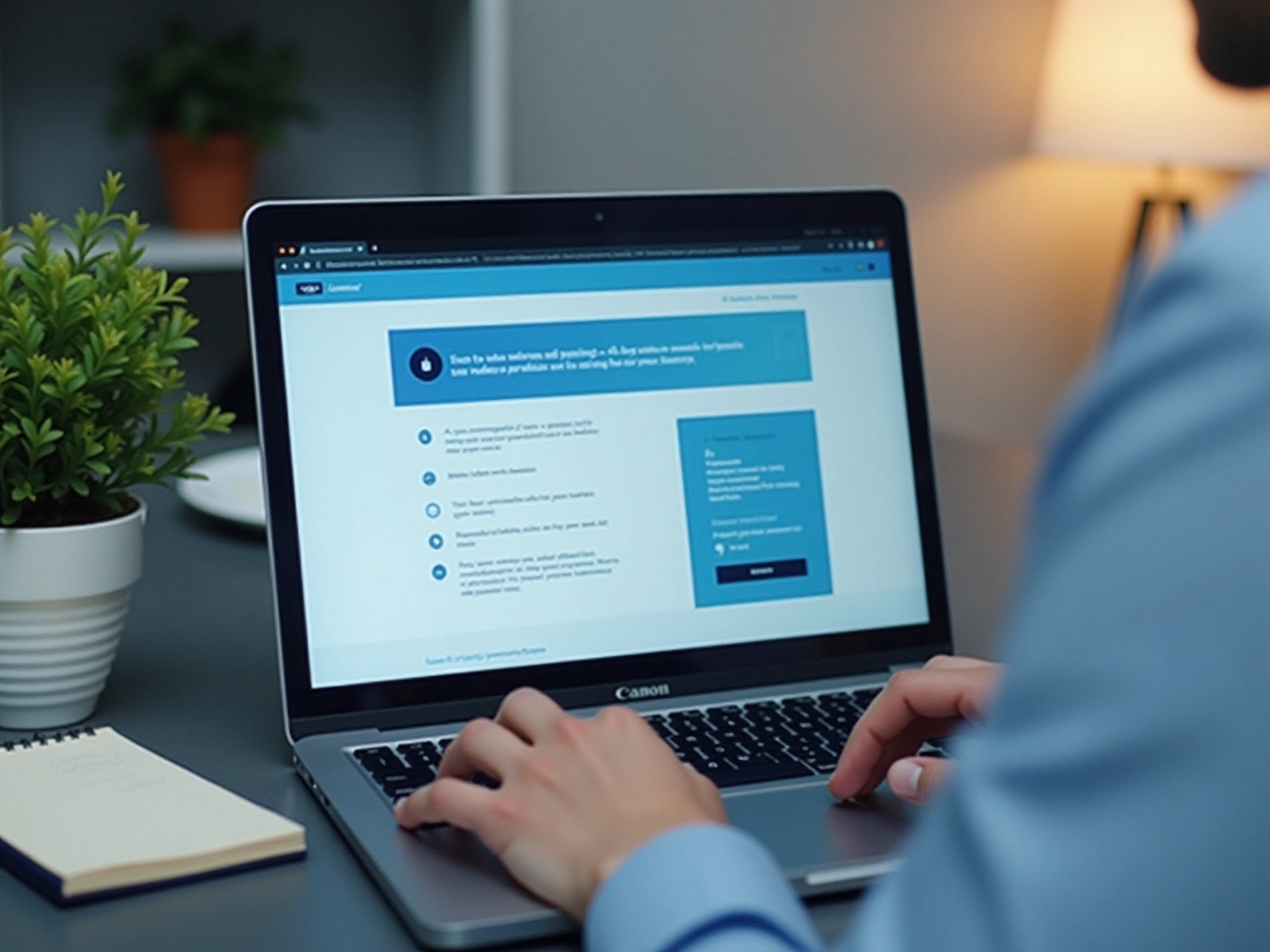How to Use AI Apply to Streamline Your Job Applications: A Step-by-Step Guide
Discover how AI Apply transforms job applications, enhancing efficiency and candidate experience.
Overview
The article asserts the critical role of AI tools in streamlining job applications, underscoring their increasing significance in boosting efficiency and personalization throughout the hiring process. By detailing features such as automated resume generation and keyword optimization, it highlights how these innovations significantly enhance applicants’ visibility and success rates, particularly for women in technology. This advancement not only addresses existing challenges but also fosters a more inclusive and effective job search experience.
Introduction
In the rapidly evolving landscape of job applications, Artificial Intelligence (AI) is revolutionising how candidates connect with potential employers. This transformation not only enhances efficiency by automating and streamlining various recruitment tasks but also significantly improves the candidate experience, making it more personalised and engaging. As organisations increasingly adopt AI-driven tools, job seekers face unique opportunities to tailor their applications, optimise their visibility, and navigate the complexities of the modern job market.
How can candidates effectively leverage these advancements? This article delves into the multifaceted role of AI in recruitment, exploring its benefits, features, and essential strategies that candidates can employ. With the promise of increased success rates and a more inclusive hiring process, understanding AI’s impact on job applications is crucial for anyone looking to thrive in today’s competitive environment.
Understanding AI in Job Applications
The integration of AI has fundamentally transformed the job submission landscape, automating and optimising numerous tasks to significantly enhance efficiency. By 2025, AI tools will possess the remarkable ability to analyse job descriptions with precision, matching them to applicant profiles, and even assisting in the creation of customised submission materials. This technological progress not only simplifies the enrolment process but also elevates candidates’ visibility to prospective employers.
The statistic that nearly 70% of corporate transformations fail underscores the critical need for effective hiring strategies to achieve organisational success. AI is playing a pivotal role in this arena, as hiring experts note that by managing repetitive tasks, AI can save recruiters an average of 4.5 hours weekly. This newfound efficiency allows recruiters to concentrate on more strategic activities that can drive better hiring outcomes, particularly in building effective data teams essential for leveraging data-driven insights.
However, organisations encounter significant challenges in becoming truly data-driven. They must develop a comprehensive understanding of a wide range of structured and unstructured data, filter and extract valuable insights, and integrate these insights into their decision-making processes. The need for hiring and redeploying staff to data teams is crucial, as it enables businesses to leverage institutional knowledge while bringing in data engineers capable of interpreting and working with complex data sets. This is particularly relevant as AI continues to impact job applications profoundly. For instance, the self-driving vehicle market, which generates over $170 billion in annual revenue, exemplifies the commercial viability and increasing acceptance of AI technologies across various sectors.
This trend is mirrored in hiring practises, where AI is expected to generate more startups and employment opportunities than it eliminates, despite concerns regarding job loss. The success of AI in other sectors illustrates its potential to enhance hiring processes, positioning it as a valuable resource for organisations like Bristow Holland that seek to utilise data for strategic decision-making.
As we advance further into 2025, the incorporation of AI in hiring processes is becoming increasingly sophisticated. Hardware advancements are enhancing AI performance, allowing companies to adopt solutions that require high processing power for real-time applications. These innovations are transforming not only how applicants seek employment but also how organisations identify and connect with talent, resulting in improved experiences for applicants and successful placements.
Expert opinions emphasise that AI’s role in hiring transcends mere efficiency; it fosters a more tailored experience for applicants. By leveraging AI, organisations can gain a deeper understanding of the unique qualifications and aspirations of applicants, leading to more successful placements. As AI continues to evolve, its impact on job submissions and hiring procedures will undoubtedly expand, making it essential for individuals to embrace these tools to navigate the challenges of contemporary job searches.

Key Features of AI Apply for Job Seekers
AI Apply encompasses several vital features designed to simplify the job-seeking process for individuals, particularly in promoting gender diversity within technology. Notably, automated resume and cover letter generation stands out, enabling candidates—especially women who may encounter unique challenges in tech recruitment—to create tailored documents swiftly and efficiently. This automation not only conserves time but also guarantees that submissions align with the specific requirements of each role, empowering women to present themselves effectively.
Another essential feature is keyword optimisation for Applicant Tracking Systems (ATS). By analysing job descriptions and suggesting relevant keywords, AI Apply enhances the visibility of submissions, significantly increasing the likelihood of recognition by recruiters. This is particularly critical, as studies indicate that effective keyword usage can elevate application success rates, making this feature indispensable in today’s competitive job market, especially for women aspiring to enter tech.
Moreover, AI Apply offers tailored job suggestions based on user profiles, assisting individuals in discovering opportunities that align with their skills and career aspirations. This focused strategy not only streamlines the job search process but also enriches the overall applicant experience, fostering an environment where women can thrive in tech careers.
As organisations increasingly adopt AI-driven hiring tools, the benefits for job seekers are becoming increasingly apparent. By 2025, it is projected that 93% of companies will invest in hiring technology to refine their selection processes. This shift underscores the growing importance of tools like AI Apply, which not only facilitate smoother submissions but also empower candidates—particularly women—to showcase their qualifications more effectively.
Additionally, U.S. employers filling positions with salaries around $60,000 save between $7,800 and $22,500 by reducing mis-hires through skills-based hiring, underscoring the financial benefits of efficient recruitment methods. Success stories surrounding automated resume generation further demonstrate the efficacy of these tools. Candidates utilising AI-driven features report higher interview rates, illustrating the tangible impact of technology on job submissions.
Notably, a study from TalentWorks revealed that resumes ranging from 475 to 600 words were the most effective in securing job interviews, highlighting the significance of concise and targeted applications. With the right tools, job seekers—especially women—can leverage AI Apply to navigate the complexities of the recruitment landscape with enhanced confidence and success. Looking ahead, there is hope that ongoing efforts to increase female representation in tech will culminate in a future where awards like the Developer Awards become obsolete, as women in tech become the standard. This vision aligns with the broader objective of achieving gender balance in the workforce, with tools like AI Apply playing a pivotal role in making this a reality.

Creating Job-Specific Resumes and Cover Letters
To create job-specific resumes and cover letters, applicants must begin by thoroughly analysing the job description to identify key skills and qualifications. Leveraging AI tools can significantly streamline this process; these tools can apply relevant phrases, formatting styles, and highlight essential keywords that align with the job requirements. By utilising AI, applicants can craft documents that not only showcase their most relevant experiences and accomplishments but also align with the specific demands of the employer.
This targeted approach is crucial. Statistics indicate that 75% of recruiters prioritise skills and competencies in their hiring decisions, while 64% utilise Applicant Tracking Systems to screen resumes. Customising resumes and cover letters can dramatically enhance an applicant’s visibility in a competitive job market. For instance, individuals who personalise their resumes are more likely to stand out, as 53% of job seekers are already utilising video resumes to showcase their personalities and skills.
Candidates are encouraged to consider creating video resumes as a way to further highlight their unique attributes.
In 2025, the significance of tailoring cover letters cannot be overstated. AI can assist in generating job-specific cover letters by providing templates and examples that apply to the nuances of the position. This not only demonstrates a genuine interest in the role but also increases the likelihood of securing an interview.
As indicated by NACE, the shift in employer screening methods reveals that while 75% of employers previously aimed to evaluate applicants based on their GPA, only 37% intend to do so now. By adopting a tailored approach to their submissions, individuals can effectively convey their suitability for the role, thereby enhancing their likelihood of success in the hiring process. Additionally, case studies such as ‘Enhancing Applicant Experience with AI’ demonstrate how AI tools optimise the hiring process by helping hiring managers align applicants with appropriate job opportunities, ultimately resulting in faster and more precise placements.

Enhancing Candidate Experience with AI Tools
AI tools significantly enhance the applicant experience by providing features that deliver instant feedback on applications, personalised job alerts, and comprehensive interview preparation resources. For instance, AI-driven platforms can replicate interview situations, enabling individuals to rehearse their responses in a realistic setting. This practise enhances their confidence and preparedness. Bristow Holland illustrates this method by making individuals feel at ease and adequately equipped. Endorsements, such as Dean Saville’s review, commend the company’s transparent communication and assistance during the hiring process.
Statistics suggest that individuals who utilise AI tools report a more efficient submission process, with 75% expressing satisfaction with the immediate feedback they receive. This prompt reply not only assists applicants in enhancing their submissions but also promotes a feeling of involvement and assistance throughout the hiring process. This aligns with Bristow Holland’s dedication to keeping individuals informed at every stage.
Moreover, Bristow Holland actively promotes gender diversity in tech by implementing initiatives aimed at encouraging women to pursue careers in technology. This commitment is evident in their hiring strategies, which emphasise creating an inclusive atmosphere for all applicants. Expert insights indicate that improving candidate experience with AI is not solely about efficiency; it’s also about fostering a more inclusive and supportive hiring process.
By encouraging diversity and accountability in algorithm selection, organisations can reduce biases that may occur during hiring. As Zhisheng Chen notes, “strengthening management measures, such as corporate ethics and external oversight, is equally important.” Additionally, case studies, such as the one examining the role of engineers in algorithmic bias, highlight the importance of careful goal setting and data selection to avoid discriminatory outcomes.
Unfit goal setting and biased feature selection by engineers can result in discriminatory outcomes in hiring algorithms, as demonstrated in the Amazon hiring case.
In conclusion, the incorporation of AI tools in hiring processes not only enhances communication and feedback effectiveness but also empowers candidates, making the job-seeking experience more positive and productive. This prompts many organisations to adopt these technologies. Organisations like Bristow Holland must adopt accountable algorithms and promote diversity in the tech industry to mitigate discrimination in AI recruitment. Ultimately, this fosters a future where women in tech are no longer an exception but the norm.
Step-by-Step Guide to Using AI Apply
To effectively leverage AI for your job applications, follow these comprehensive steps:
-
Sign Up: Begin by establishing an account on a reputable AI job submission platform. This initial step is crucial as it lays the groundwork for your job search.
-
Profile Setup: Input your professional details meticulously. Include your skills, experiences, and career aspirations. A well-crafted profile enhances your visibility to potential employers and aligns your qualifications with job opportunities.
-
Job Search: Utilise the platform’s advanced search features to find job listings that closely match your profile. Tailoring your search criteria significantly enhances the relevance of the positions you discover.
-
Resume and Cover Letter Generation: Employ AI tools to produce tailored resumes and cover letters for every submission. These tools analyse job descriptions and suggest keywords and phrases that improve your chances of passing through Applicant Tracking Systems (ATS).
-
Submit Applications: Apply directly through the platform, ensuring that all your materials are optimised for ATS. This step is vital as many companies rely on these systems to filter applicants before human evaluation.
-
Track Progress: Use the platform’s tracking features to monitor the status of your submissions. This allows you to follow up appropriately and stay informed about your job search progress.
In 2025, individuals utilising AI employment tools have reported success rates considerably greater than those relying on conventional methods, with some studies indicating success rates exceeding 70%. Success stories abound, showcasing individuals who have streamlined their job searches and secured positions through these innovative platforms. For instance, a recent case study highlighted how a candidate effectively utilised AI to tailor their submissions, resulting in several interview invitations within weeks.
As Gina A. Tran noted, “Between 2013 and 2018, the expected organic reach of a brand’s Facebook post dropped from 12% to 5%.” This statistic underscores the importance of enhancing your job submissions in a competitive digital landscape, where distinguishing oneself is essential.
Furthermore, the recruitment landscape is evolving, and interdisciplinary collaboration between Information Systems and marketing scholars is crucial for advancing research on customer engagement and digital marketing. By adhering to these steps and enhancing your job submissions with AI, you can significantly boost your chances of securing your desired position in the competitive job market.

Benefits of Using AI Apply for Job Applications
Employing AI offers numerous benefits that significantly enhance the job submission process, particularly for women in technology. One of the primary advantages is the increased efficiency it delivers, allowing applicants to streamline their submissions and reduce the time spent on job searches. In 2025, individuals who utilise AI tools reported a remarkable improvement in the personalisation of their materials, tailoring their résumés and cover letters to align more closely with specific job criteria.
This level of personalisation not only captures the attention of recruiters but also elevates the chances of securing interviews. Statistics reveal that candidates who leverage AI in their job applications experience higher success rates. A recent analysis indicated that AI tools can enhance interview success rates by up to 30%, underscoring their effectiveness in boosting visibility to recruiters. Furthermore, a survey conducted by the Recruitment and Employment Confederation (REC) highlighted that 54% of hiring functions now employ artificial intelligence for talent sourcing, with 44% utilising it to assist in interview and selection processes.
This trend underscores the growing reliance on AI to optimise various stages of hiring. At Bristow Holland, we understand the importance of clear communication and personalised assistance throughout the hiring journey. Our candidates appreciate our commitment to keeping them informed at every stage, which fosters confidence and alleviates anxiety, especially for women entering tech roles. As of February 2024, the AI recruitment industry is valued at $590 billion, emphasising the critical role of AI in recruitment.
Beyond enhancing success rates, AI tools also create a more efficient job search experience. By automating repetitive tasks, individuals can focus more on interview preparation and expanding their professional networks. As organisations increasingly adopt AI technologies, the landscape of job submissions continues to evolve, making it essential for individuals to embrace these innovations to remain competitive in the job market.
As Sam Altman, cofounder and CEO of OpenAI, stated, “People are using [AI] to create amazing things. If we could see what each of us can do 10 or 20 years in the future, it would astonish us today.” Overall, the job submission process improves when candidates leverage AI, enabling them, particularly women, to achieve their career objectives more efficiently.

Overcoming Job Application Challenges with AI
Job seekers frequently encounter significant challenges in the competitive landscape of job submissions, characterised by fierce competition, poorly tailored applications, and a lack of constructive feedback. In 2025, statistics reveal that 68% of employees express a desire for enhanced AI technology in their workplaces, with 56% utilising AI daily to improve their performance. Notably, 76.7% of AI users depend on OpenAI models in production, with GPT-4 emerging as the most utilised model at 45%. This growing reliance on AI underscores its potential to transform the job submission process.
AI can effectively address these challenges by leveraging valuable insights into current job market trends. As highlighted in the SmartRecruiters 2024 Talent Acquisition Survey, businesses are urged to rethink their talent acquisition strategies in light of increasing complexities and inefficiencies. This survey indicates a pressing need for solutions where AI can streamline recruitment processes and enhance decision-making, directly impacting job seekers.
Candidates can utilise AI tools, such as resume optimisation software and AI-driven job matching platforms, to identify relevant skills to emphasise in their applications, ensuring that their submissions are not only well-crafted but also strategically aligned with employer expectations. Moreover, job hunters can apply real-time feedback on their submission materials to refine their strategies based on data-driven insights.
A notable case study in the advertising and marketing sector reveals that 51% of workers anticipate their roles will evolve due to AI, underscoring the necessity for industry-specific training and adaptation strategies. This expectation reflects a broader trend where AI is reshaping job functions and the skills required for success. Additionally, the tech career landscape has seen an increase in women entering various roles, particularly in sectors like digital marketing, where they often engage in tech-related tasks without fully recognising it.
This shift highlights the importance of acknowledging diverse roles within the tech industry and encouraging women to pursue positions traditionally dominated by men.
Expert insights suggest that candidates can benefit from AI assistance in navigating the competitive job market by analysing submission trends and proposing enhancements. As Rebecca Carr, CEO of Bristow Holland, emphasises, “The future of talent acquisition is not just about saving time—it’s about enabling smarter, more informed hiring decisions that drive long-term business success.”
By embracing AI solutions and applying them effectively, job seekers can overcome challenges in their submissions, enhance their chances of success, and position themselves strategically in a rapidly evolving job market, while also contributing to a more inclusive tech environment.

The Future of AI in Job Applications
The future of AI in job submissions is on the brink of transformative progress, characterised by trends that emphasise greater personalisation, enhanced predictive analytics, and a more profound integration of AI tools within the hiring process. By 2025, applicants can anticipate the emergence of advanced AI-driven platforms that not only streamline the application process but also offer invaluable insights into employer expectations and the evolving dynamics of the job market.
Predictions underscore that AI will be pivotal in refining hiring processes, with tools designed to assess essential skills and standardise interviews, thereby mitigating bias and enriching the overall applicant experience. This is particularly crucial in addressing gender disparities in technology hiring, where research indicates that women often apply for positions only when they meet nearly all qualifications, while men tend to apply with less certainty. This disparity highlights the urgent need for AI to foster a more inclusive environment that encourages all candidates to submit their applications, regardless of their perceived qualifications.
Moreover, expert insights suggest that the evolution of AI in recruitment will focus on leveraging data to more effectively align applicants with suitable job opportunities. Eric Dozier, Executive Vice President of Human Resources and Diversity, asserts, “The more we can leverage AI to assess your skills and match you with different jobs, the more you can be successful — to me, that’s exciting.” This paradigm shift will not only facilitate a more efficient hiring process but also empower individuals, particularly women, to navigate their career trajectories with heightened confidence.
As organisations increasingly integrate AI tools, job seekers must remain vigilant about these advancements to effectively navigate their job searches. Additionally, the rise of flexible work arrangements in technology, accelerated by the pandemic, presents an opportunity to attract a more diverse pool of applicants, including women who may seek such environments. However, the persistent issue of underrepresentation of women in technology complicates hiring efforts.
Societal attitudes toward AI are mixed; while some express optimism regarding its benefits, others remain cautious about its implications. Grasping these perceptions will be essential as candidates engage with AI-driven recruitment processes.
In conclusion, the landscape of job applications is rapidly evolving. Those who embrace these changes—especially in terms of confidence and inclusivity—will be better positioned to thrive in a competitive environment.

Conclusion
AI is fundamentally reshaping the job application process, presenting unprecedented opportunities for candidates to enhance their visibility and tailor their applications effectively. The integration of AI tools streamlines recruitment tasks and personalises the experience for candidates, ensuring their unique qualifications and aspirations are recognised. Features such as:
- Automated résumé and cover letter generation
- Keyword optimisation for Applicant Tracking Systems
- Personalised job recommendations
empower job seekers to navigate the complexities of the modern job market with greater ease and success.
Moreover, the increasing reliance on AI-driven tools in recruitment underscores the necessity of embracing technology to tackle common challenges faced by candidates. By leveraging AI, job seekers can refine their applications, receive real-time feedback, and align their submissions with employer expectations. This proactive approach not only boosts interview success rates but also fosters a more inclusive hiring environment, particularly for underrepresented groups such as women in technology.
Looking ahead, the future of AI in job applications promises even greater advancements in personalisation and predictive analytics. As organisations continue to adopt these technologies, candidates who remain informed and adaptable will be well-positioned to thrive in a competitive landscape. Ultimately, embracing AI transcends mere efficiency; it empowers candidates to achieve their career goals and contribute to a more diverse and inclusive workforce. Are you ready to harness the power of AI and elevate your job search? The time to act is now.
Frequently Asked Questions
How has AI transformed the job submission landscape?
AI has automated and optimised numerous tasks in the job submission process, enhancing efficiency and simplifying enrolment. By 2025, AI tools will be able to analyse job descriptions, match them to applicant profiles, and assist in creating customised submission materials.
What are the benefits of AI for recruiters?
AI helps recruiters save an average of 4.5 hours weekly by managing repetitive tasks, allowing them to focus on more strategic activities that improve hiring outcomes.
What challenges do organisations face in becoming data-driven?
Organisations must develop a comprehensive understanding of both structured and unstructured data, filter valuable insights, and integrate these insights into decision-making processes. They also need to hire and redeploy staff to data teams to leverage institutional knowledge and work with complex data sets.
Will AI create more job opportunities or eliminate them?
AI is expected to generate more startups and employment opportunities than it eliminates, despite concerns about job loss. Its success in other sectors illustrates its potential to enhance hiring processes.
How is AI improving the hiring process?
AI is making hiring processes more sophisticated by leveraging hardware advancements for better performance, enabling real-time applications, and transforming how organisations connect with talent.
What is AI Apply and how does it assist job seekers?
AI Apply includes features like automated resume and cover letter generation, keyword optimisation for Applicant Tracking Systems (ATS), and tailored job suggestions based on user profiles, all aimed at simplifying the job-seeking process and promoting gender diversity in technology.
How does keyword optimisation in AI Apply benefit applicants?
Keyword optimisation enhances the visibility of submissions by suggesting relevant keywords based on job descriptions, significantly increasing the likelihood of recognition by recruiters.
What is the projected investment in hiring technology by 2025?
By 2025, it is projected that 93% of companies will invest in hiring technology to refine their selection processes.
What financial benefits are associated with efficient recruitment methods?
U.S. employers filling positions with salaries around $60,000 save between $7,800 and $22,500 by reducing mis-hires through skills-based hiring.
What is the significance of concise resumes in job applications?
A study revealed that resumes ranging from 475 to 600 words are most effective in securing job interviews, highlighting the importance of concise and targeted applications for job seekers.







